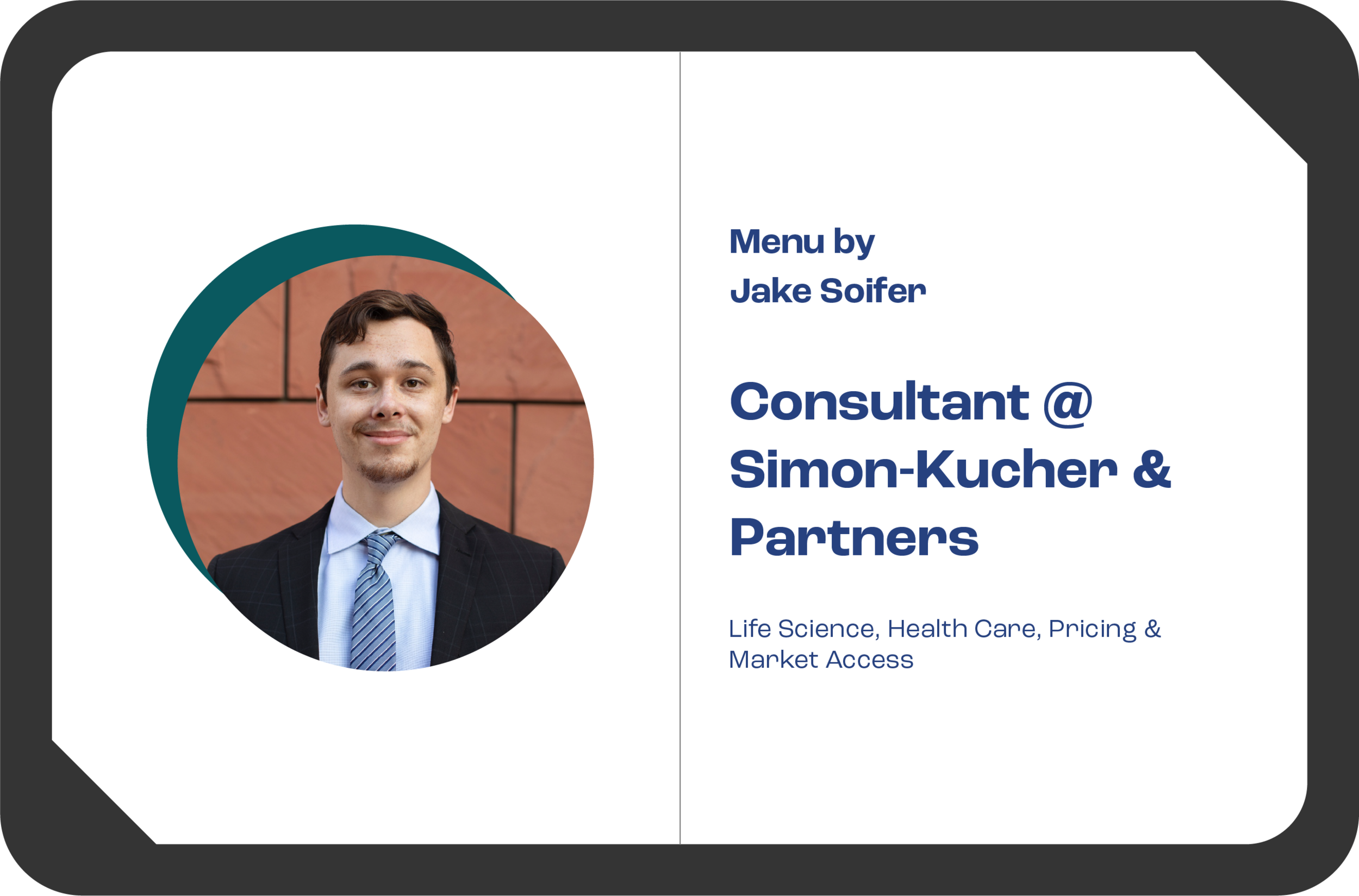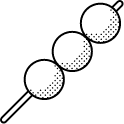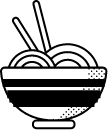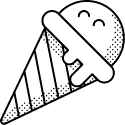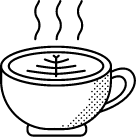
Tasting Room > Business, Management, Admin Table > Jake Soifer
Interview conducted in January 2022
Appetizers
Starting with some basics.
Job Title + Years of Experience
Consultant, 1 year
Areas of Expertise
Life Science, Health Care, Pricing & Market Access
Company + Industry
Simon-Kucher & Partners, Life Science Consulting
Education
The Wharton School of the University of Pennsylvania, Bachelor’s in Economics with a Concentration in Health Care Management and Policy
Fun Starters
Getting to know the human side.
Favorite dessert?
Ice cream
Favorite book or movie?
My favorite movie has to be Primer, and since I'm edgy my favorite book is Crime and Punishment
Myers-Briggs personality type
I'm between ENTJ and ENFJ
What do you like to do for fun?
I like to read, play guitar, and go hiking / exploring the area with friends.
What's one thing you recommend doing in your city, San Francisco, California?
You have to try the milkshakes at Ghirardelli!
Main Course
A quick deep dive into the day-to-day job.
Tell us about yourself and your job.
I work in teams that help biopharma companies figure out the best way to launch a product, both in the US and all around the world. This helps them make sure their medicine is covered by insurance and that their doctor will be in a position where they can provide it when it's applicable.
There are a lot of applications for this kind of work, and we can influence the funding a given idea gets, the design of a scientific clinical trial, and the way biopharma companies bring their products to market. As a low-level member of these teams, I follow more experienced members in gathering data and building out the presentations we use to communicate the dense, nuanced findings or our research in a way everybody can understand.
How did you end up in your field? What do you like about it?
I started off pursuing a biology degree, but when I realized the pre-med and Ph.D. tracks were not right for me I had to figure out what I wanted to do. Thankfully, as part of my biology coursework, I was exposed to classes on bioethics and health policy.
I ended up choosing biopharmaceutical market access because I wanted a job where I could stay close to the innovative side of the industry while doing work that I felt I could be good at.
What does a typical morning look like on the job?
In the morning, usually, I check in with the other 3-4 members on my team, sometimes with a short meeting where we plan out what we're going to do for the day. Usually, I know generally what we're going to do, but by talking face-to-face or over zoom we can break the several-step task that we're addressing for the day down into small tasks with set people for each action item.
From there, it's time to get started on the work, which could be anything from primary interviews with industry leaders to building out presentations to communicate your findings with clients.
Cool, then what does a typical afternoon look like?
The afternoon is a lot like the morning. Typically, around noon we have a second quick meet-up to make sure everyone's still doing okay. From there, it's back to research and slide building!
What types of projects and meetings are you involved in?
My work is project-based. A client will hire us to answer some questions for them and it usually takes 4 months to do. I like the variety this gives me since biopharma might seem really specific but it's actually a huge space with big differences between over the counter drugs, knee replacements, and cutting-edge cancer medicine.
To do the work, we usually have one or two meetings where we agree on the big question and pick the smaller questions we have to answer in order to make good recommendations on how they should tackle that big question. For example, the client might want to know what price to launch a drug at in France and so we would want to see:
1) how the French gov. would view the drug as either valuable or not and
2) how the French government handles drug pricing negotiations, including their methods and objectives.
Once we know our actionable questions, we do primary research by talking to people with knowledge of the fields. In the prior example, it might be a representative of the French government who works in price negotiations. Finally, we present the findings in a large meeting with the client where we answer their first big question based on what we learned in the interviews and our expertise.
I say our expertise because you might not start out as an expert on life science, but when you interview industry experts for a living you will very quickly become an expert of your own, which makes this job a great fit for people who are curious and like to explore complex spaces.
Who do you collaborate with in meetings and projects? Cross-functional teams? What's it like?
Usually, work is done by a team consisting of members of the life science team and has one-two people with 1-2 years of experience, one with 3-4, one with 4-5, and one with 10+.
Dessert
Now for some juicy insights in the tea room.
What's the most challenging thing about your job?
Slide building and research can get very repetitive as tasks, although it is mitigated a lot by the different content we research. So the process of conducting research is typically the same, but the content we're covering is always changing.
What are some characteristics that can help someone succeed in your role?
In my role, the biggest things are the ability to take initiative and carry yourself confidently. It's really daunting working with people with so much knowledge and it can be scary to ask a question that might sound silly or obvious. But if you're confident and treat your superiors like equals, you can lose the jitters and have those substantive conversations.
On that same note, people who do well here tend to be able to say, "Yeah, I can do that," as opposed to stopping to ask someone to confirm their idea.
Any advice on how to stand out and get hired for those just starting off?
We do not screen people based on major since the assumption is that new hires have no relevant skills. Without major expertise, the big thing is clear, unambiguous communication.
On your cover letter, say, "My name is ___, I am a ___ year at ____ University studying ____ and I'm writing this letter to apply for the position of _____ and _____ company." We read every resume, there is no robot and it's way more about the letter than the resume. There's always a way to turn a niche-specific experience into a general one.
You flex tons of muscles doing everything you do at school, so while you might think of something as "bio experience" or "music experience" think about the muscles this job wants you to flex (strategic thinking, communication skills, working with other people / taking initiative) and reexamine your past experiences, you might find you're more qualified for the job than you first thought!
What's something that surprised you about your job?
I was surprised at how mellow everyone was. In school, everyone is very competitive, but at least where I work people seem more individually motivated and also just less focused on winning all the time than just getting good work done and then signing off for the day, which I personally really enjoyed seeing.
What do you see your next step being?
This one's tough. I have a few ideas that mainly boil down to staying here for the long haul since there are tons of opportunities for internal growth or leave, either for the industry as a strategy leader (or realistically in 5 years, a support person under a strategy leader) or go back to school to get an MBA.
Any last thoughts, advice, or recommendations for someone who wants to do what you do?
Go for it! A lot of folks in consulting and especially LS consulting have crazy backgrounds, but anyone can do it if you're interested and patient enough to learn!

